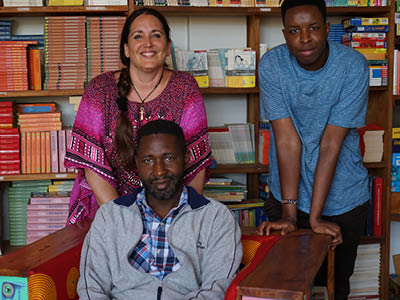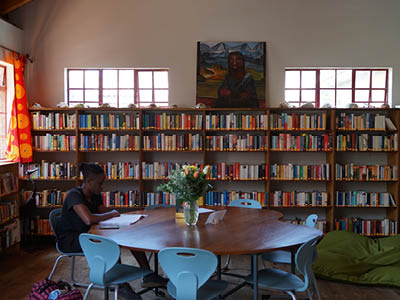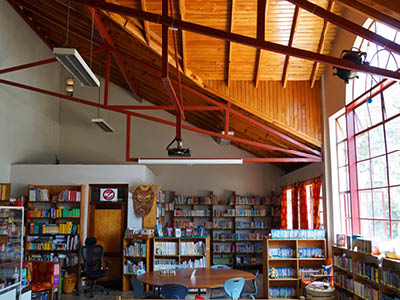Facilities
The Cafeteria at the German School Nairobi
Good food at school doesn’t just contribute to children being fit enough for the school day, it shapes their food culture, their appreciation of food and their nutritional behaviour. Balanced and healthy meals are of great significance for the development and capabilities of children and young people. For this reason, the German School Nairobi works with a physiological diet concept, which offers not just healthy and freshly prepared meals, but also provides education in the lunch break. Here, the German School draws up a reduced meat menu with lots of vegetables and a balance of carbohydrates and proteins. A large proportion of the raw ingredients used by the German School are from local producers. Fruit and vegetables especially, but also grains, meat and fish, wherever possible, come from sustainable ecological production. The school also farms its own garden, using the harvest in the school kitchen.
Since the kitchen and canteen of the Geman School Nairobi was rebuilt in 2020, the kitchen staff have worked to the modern European standard and with the highest hygienic requirements to guarantee maximum product safety. The supply to the kitchen and canteen has also been more sustainable since the rebuild. We get our power from a photovoltaic system, which covers one hundred percent of the power demand in good weather. The water comes from our own well and is reprocessed after use and used to irrigate the sports facilities.
The kitchen team
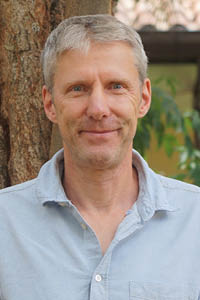
Bartsch, Peter

Wathome, Catherine
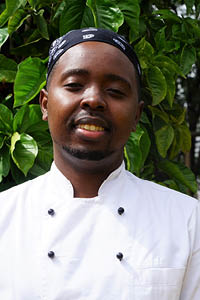
Mwiti, Kelvin

Imali, Lucy
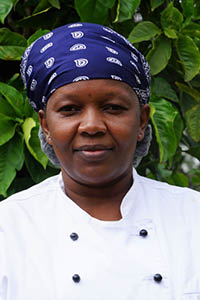
Mbula, Damaris
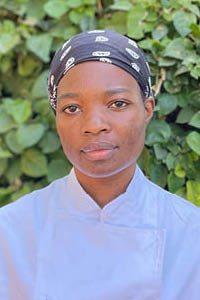
Miraho, Sharon
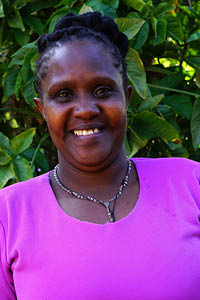
Muthoni, Serah
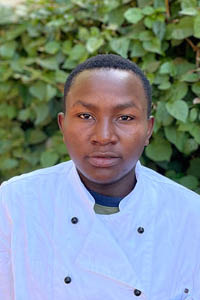
Njue, Johnian
AHK Dual vocational Training
Dual education is a programme, which combines theory and practice so that the trainees don’t just acquire theoretical knowledge at the end of their training, but also practical experience in their profession.
The AHK Kenya training programme has been adapted to the German framework teaching plan for chefs and the hotel trade and is thus recognised by the Kenyan government as well as by Germany as a professional diploma.
The programme was started in Kenya by the Delegation of German Economics (AHK) in partnership with the German School Nairobi and some hotels with the goal of offering young adults high quality training. They should be qualified enough to quickly enter the job market because companies are prepared to employ them after receiving their diploma. This should lower the unemployment rate in Kenya.
Since the start of 2019, the German School Nairobi has been part of the training programme. The theoretical lessons take place at Kibondeni College in Westlands, Nairobi, under various tutors, the practical lessons are taught by the kitchen managers at the German School Nairobi.
Although the German school association is not a hotel or a restaurant, we have decided to participate in the programme to extend our educational remit in this way and to offer a vocational education option, especially for young Kenyans in additon to the academic education.
Weekly Menus
The health centre of the GSN
There is a first aid room at the German School Nairobi, where there is always a school nurse during school times, who is there for your children.
During the school day, a child can always suddenly feel ill or injure themselves while playing or running around. In this case, you can rest assured that we will immediately take adequate care of your child.
Healthy children learn better!
Our school is not just a place of learning, but also a place of living, where health prevention begins. How does my diet relate to my wellbeing? Why is it so important to move enough and what does my sleep have to do with my health? We explore all these exciting questions with your children in various projects to keep your child healthy.
A warm welcome and wishing you well,
Elizabeth Gicura
The Health Team
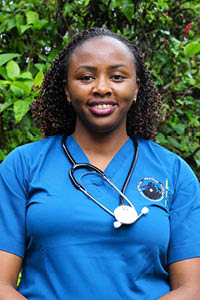
The Pool Team
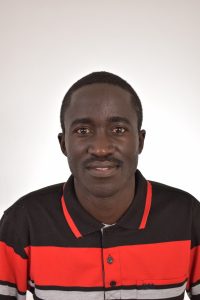
Kibisu, Vincent

Majalle, Dennis

Otieno, Moses
Pool Parties
Dear Members of the school community, for pool party inquiries, please write an email to poolparty@germanschool.co.ke
DSN Swimming Pool Rules
Pool Opening Hours
Dear School Community,
the swimming pool of the DSN is available to all members of the school association at the following times*:
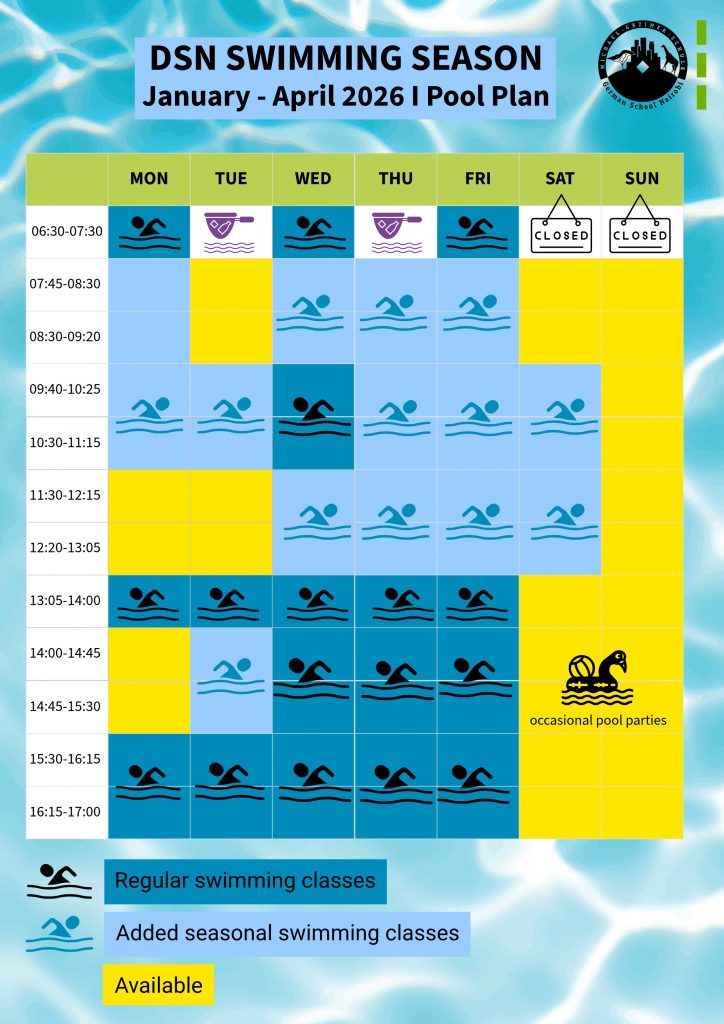
Upcoming Pool Parties
Dear School Community,
Please check the pool parties section of the website for more information.
Thank you for your understanding!
playgrounds

At school, not only does learning take place in the classroom, but there must also be enough time to exercise in the fresh air. Is there anything better for children than a playground with as many different and inviting playground equipment as possible?
There are four different playgrounds for different age groups on the school grounds.
When you enter the school through the main gate, you immediately see the large playground for the primary school children on your left. The children enjoy a climbing frame, swings, a sandbox or a net swing during their breaks. The absolute highlight is a merry-go-round that hardly ever stands still during the seasons. Many an adult's heart almost stops when you see the courage and speed with which the students go around in circles. Some families also like to use the playground on weekends or stay longer after school to play. Benches to sit on also invite parents to linger.
There are three other playgrounds for the little ones in our community, for the kindergarten children. In a rotation principle, the groups take turns on the different playgrounds. There is a playground right by the main building with a large tree in the middle that provides shade. Here you can ride hippos, balance on a log, play in the sand, spin on a jungle gym and much more.
The second playground is not far from the group rooms. A rope attached to the large tree is just as fun as the play hut with a slide or the swings. Sometimes the jumping pit of the sports facilities is simply used as a sandpit.
At the very end of the sports field, a short walk takes you to the last playground in the row. There is the largest sandbox on the site, beautifully situated in the shade, spring seesaws, another play hut with a slide, swings and even a trampoline.

School Buses
The German School Nairobi offers school bus transport for school children and kindergarten children.
Children under three years of age (playgroup) are only allowed to ride the bus when accompanied by an adult.
The children are picked up at their place of residence (in front of the respective property) and then dropped off again. The parents are responsible for safety up to the point of boarding the bus, even if the bus waits until the children have passed through the gate.
Registration for the School Bus Transport
The registration for the school bus transport as well as for the AGs and lunch takes place for the entire school (kindergarten, elementary school and secondary school) at the beginning of each new school semester via a bundled online registration. The registration form can be found here.
The link for the online registration will be communicated to the parents by email within the first school week of the new school semester. There is an option to register for round trip or one way only. Transportation will be charged for this option.
If you have any questions regarding registration, re-registration (in case of change of address) or deregistration of your child/children during the current school term, please contact our secretary by email - night.kagoni@germanschool.co.ke.
School Bus Transport Costs
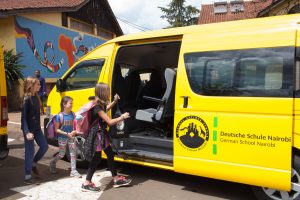
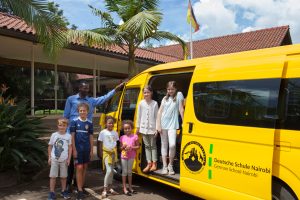
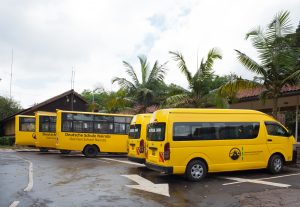
Daily Transport Tickets
If required, you can also register your child for school bus transportation on a daily basis. You can choose between single trips (outward or return) and round trips (outward and return). You can find the current prices on the booking form here.
Applications can be submitted for one calendar week at a time. Bookings must be received at least 24 hours prior to the scheduled time. If you have any questions, please contact Elkana Njuguna (contact below).
Children who are firmly registered for the tours have priority. For children with individual tickets, no guarantee can be given that there will be space on the buses. In the rare cases where space is not available, parents will be notified accordingly.
The pick-up times for children in the morning depend on the number of registrations and bus routes and will be communicated to the parents in each case. These times must be adhered to, as bus drivers are encouraged not to wait for children in order to be at school in time for the start of classes. Afternoon departure times from school are as follows:
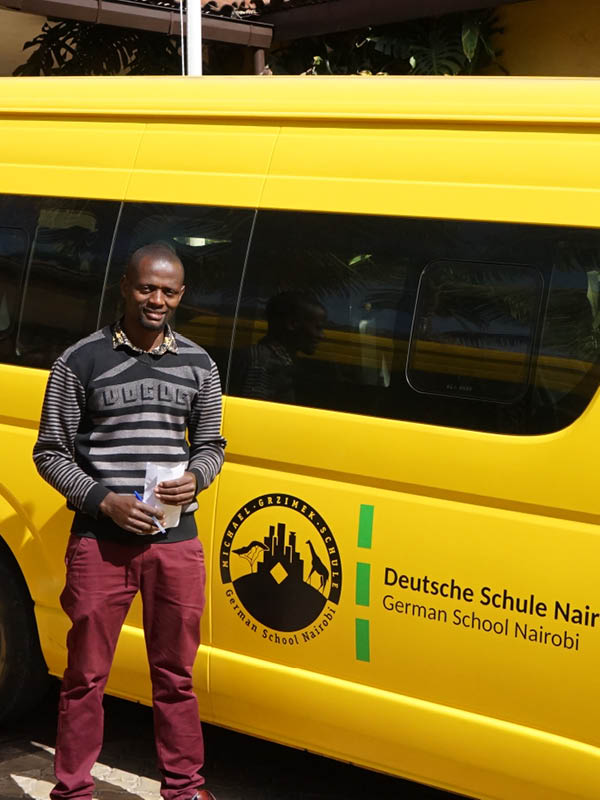
(Mo - Thu) 1.30 pm, 3.30 pm, 5.00 pm
(Fr ) 1.15 pm
If children who are firmly registered do not need transport due to illness or other reasons, please inform the Head of Transport as soon as possible.
Head of Transport
Elkana Njuguna:
Tel. 0723 314488
Mail: transport@germanschool.co.ke
Karibu at the library!
Are you a bookworm or do you want to become one? Do you like researching all kinds of things? Do you love playing chess and other games? - Then make your way to our school library. Although it's in a hidden corner of the school building, you can't miss us.
We offer a pleasant environment for academic research, but also just for reading. We also have a cozy reading corner for younger readers where there are books for all ages to discover.
We also organize reading evenings, where parents or teachers read a book to the students, as well as film evenings, where films are watched together.
The library team is always available to help and advise you and yours. Come and discover our range of books, games, films and audio books ready for all to enjoy.
Alexandra & Joseph
- The library team -
Library rules / registration
The students of the DSN are provided with library passes and the library usage regulations to prepare them as best possible to use large city of university libraries later in life.
Registering to use the school library is necessary to participate in obligatory teaching units like reading the class reading list in German and English lessons and researching topics.
We therefore ask you to read the attached rules of use together with your children and to fill out the registration form for students.
We also invite you as a parent to loan books for yourself or your nursery children from our library. To do this, please also fill out the registration form for parents.
Download
Registration for students in grades 1 to 12
Work is still going on here ...




